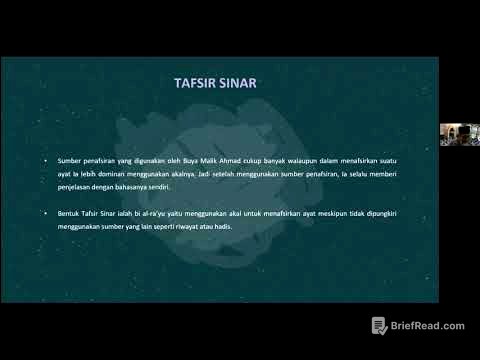TLDR;
This video provides a detailed overview of the Mongol Empire, focusing on Genghis Khan's rise to power, the empire's expansion, and its impact on Eurasia. It explores the social and political background of the Mongols, their military strategies, and their interactions with other cultures. The lecture also discusses the legacy of Genghis Khan and his influence on subsequent leaders.
- Genghis Khan united nomadic tribes to form a fearsome army and establish a vast empire.
- The Mongol Empire facilitated trade and communication across Eurasia.
- The Mongols adapted their traditional customs to govern diverse populations.
Introduction to the Nomatic Empire [0:03]
The session introduces the Nomatic Empire, specifically focusing on Genghis Khan and the events before, during, and after his reign. The discussion aims to provide a comprehensive understanding of how Genghis Khan transformed from a feared king into a leader who united nomadic people and established a vast empire. The lecture emphasizes the importance of this chapter for understanding history and answering various types of questions.
Understanding the Term Empire [1:58]
The lecture defines the term "empire" in the context of nomadic people. It explains that an empire is formed when people gather in a specific, permanent location, engage in activities like agriculture and trade, and establish trading relations with other countries. The arrival of Genghis Khan unites these nomadic groups, providing stability and leadership. The social and economic structures of the nomadic people are diverse, and the empire incorporates various communities.
The Mongol Empire and Its Expansion [7:11]
The lecture discusses the Mongol Empire's geographical expanse, highlighting Genghis Khan's role in uniting nomadic people and establishing the empire. It connects the Mongol Empire to earlier themes, such as the division of Islamic lands. The Mongols established a transcontinental empire, facilitating seasonal movement and trade. The empire's expansion included parts of Europe and Asia, leading to the term "Eurasia."
Social and Economic Structures [11:07]
The lecture contrasts the nomadic lifestyle with agrarian-based societies, emphasizing the importance of a king and an administrative system for building an empire. The Mongols, originally shepherds, adopted agriculture from China to grow their economy. The society was not an isolated island, and historical changes occurred due to the Mongols' interactions with other cultures.
Adapting Traditional Customs [13:07]
The lecture explains how the Mongols, under Genghis Khan, adapted their traditional social and political customs to create a fearsome military. The Mongols innovated and compounded their strategies, significantly impacting the history of Eurasia. The Mongols' success changed the character and composition of their society forever.
Sources of Information About the Mongols [16:05]
The lecture discusses how we know about the Mongols, primarily through chronicles and documents produced by city-based literature. These accounts are often biased, with some authors presenting a negative view of nomadic life. However, some travelers and individuals who served the Mongol masters provided more sympathetic accounts. Russian scholars also contributed valuable research on the Mongols.
Early Challenges and the Rise of Genghis Khan [29:46]
The lecture describes the early 13th century, when the Mongol tribe emerged as a threat to the great empires of Eurasia. Genghis Khan united the Mongols and established his empire, driven by a political vision and a belief in a mandate from God to rule the world. He consolidated his hold over the Mongol tribes and led campaigns into North China.
Expansion and Threats [34:46]
The lecture discusses Genghis Khan's grandson, Monke, who threatened the French ruler Louis IX. The Mongols expanded their empire, with another grandson devastating Russian lands up to Moscow. The Mongols captured Bukhara in 1220, and Genghis Khan used the victory to assert his authority and divine right.
Creating the Mongol Empire [42:10]
The lecture explores how the Mongols created their empire, highlighting Genghis Khan's military power and administrative skills. The Mongols related to diverse social and religious groups, uniting them under their dominion. The political background of the Mongols is examined, focusing on their social and political structures.
Social and Political Background of the Mongols [44:34]
The lecture details the social and political background of the Mongols, noting their diverse population and linguistic similarities. The Mongols included pastoralists, hunters, and gatherers. Scarce resources led to divisions within the society, with wealthier families exerting more influence. Natural disasters often led to conflict over resources.
Military Strategies and Organization [51:10]
The lecture discusses the Mongols' military strategies, including their horsemanship, archery skills, and ability to coordinate attacks. The Mongols used frozen rivers as pathways and developed light, portable equipment for effective attacks. The career of Genghis Khan is examined, from his birth in 1167 to his death in 1227.
The Career of Genghis Khan [1:05:24]
The lecture details Genghis Khan's early life, including his father's murder and his wife's kidnapping. These events shaped his character and drove him to seek revenge and unite the Mongol tribes. In 1206, Timuzin was proclaimed Genghis Khan, the universal ruler of the Mongols.
Successors and Division of the Empire [1:08:18]
The lecture discusses the successors of Genghis Khan, including his sons and grandsons, who continued to expand the Mongol Empire. After Genghis Khan's death, his descendants began to rule, leading to separate dynasties in different areas. The lecture mentions the Yuan Dynasty in China and Iran, as well as the rule of Jochi in Russia and Chakdai in Central Asia and Turkistan.
Mongol Influence on Trade and Communication [1:15:56]
The lecture explains how the Mongols facilitated trade and communication by providing safe passes for travelers and revitalizing trade routes. Traders paid taxes, and the Mongols established a postal relay system called "Yam." The military organization of the Mongols is discussed, including the decimal system and the role of loyal followers.
Legacy and Impact on World History [1:27:46]
The lecture examines the legacy of Genghis Khan and the Mongols in world history. While often remembered as conquerors, the Mongols also brought prosperity and established a vast transcontinental empire. Genghis Khan is celebrated as a national hero in Mongolia, and his legacy continues to influence subsequent leaders.









